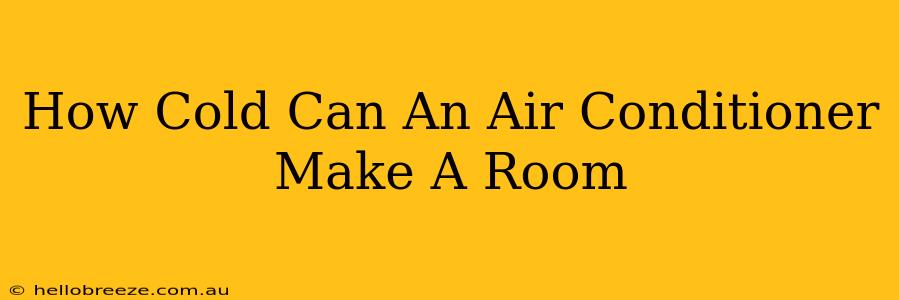Summer heat can be unbearable. That's where your air conditioner comes in, promising a cool refuge. But just how cold can it really get? The answer isn't a simple number, and it depends on several factors. Let's dive into the science (and the comfort) behind air conditioner cooling power.
Understanding Your AC's Capabilities
Your air conditioner doesn't create cold; it moves it. It works by transferring heat from the inside of your home to the outside. The temperature it achieves depends on several key elements:
1. The AC Unit's BTU Rating
BTU stands for British Thermal Units, a measure of cooling capacity. A higher BTU rating means a more powerful unit capable of cooling a larger space to a lower temperature. Check your air conditioner's manual to find its BTU rating. This will give you a baseline understanding of its potential.
2. The Size of the Room
A small room will cool down faster and reach a lower temperature with a lower BTU unit compared to a large, open-plan living area. Oversized or undersized units are equally inefficient. An undersized unit will struggle to cool the space sufficiently, while an oversized unit may cycle on and off too frequently, preventing it from reaching optimal temperatures.
3. Insulation and Sealing
Poor insulation and leaky windows and doors allow outside heat to seep in, making it harder for your AC to maintain a low temperature. Proper sealing and insulation are crucial for energy efficiency and optimal cooling. Consider weatherstripping, caulking, and window films to improve your home's thermal performance.
4. Ambient Temperature
The hotter it is outside, the harder your AC has to work. On extremely hot days, you might find your air conditioner struggles to reach its lowest possible temperature. Consider using window coverings or blinds to reduce the amount of solar heat entering your home.
5. Airflow and Ventilation
Obstructions like furniture blocking vents or closed doors can restrict airflow, hindering your AC's ability to evenly distribute cool air. Ensure proper airflow by keeping vents clear and doors open to allow air circulation.
6. The Thermostat Setting and its Accuracy
While you can set your thermostat to a very low temperature, your AC might not be able to reach it. A malfunctioning thermostat can also affect the accuracy of temperature readings. Regular maintenance checks on your thermostat are vital for optimal performance.
The Ideal Temperature Range
While the exact lowest temperature achievable varies, most air conditioners can comfortably cool a room to between 68°F and 72°F (20°C and 22°C). Going much lower than this isn't only unnecessary but could also lead to discomfort and increased energy bills.
Maintaining Your Air Conditioner for Optimal Performance
Regular maintenance significantly impacts your AC's cooling efficiency. This includes:
- Changing air filters regularly: Clogged filters restrict airflow and reduce cooling capacity.
- Scheduling annual professional maintenance: A technician can identify and address potential issues before they become major problems.
- Cleaning condenser coils: Clean coils ensure optimal heat transfer.
By understanding these factors and taking appropriate steps, you can maximize your air conditioner's cooling power and enjoy a comfortably cool home throughout the summer. Remember, a well-maintained system operating within its design parameters will provide the best results.

